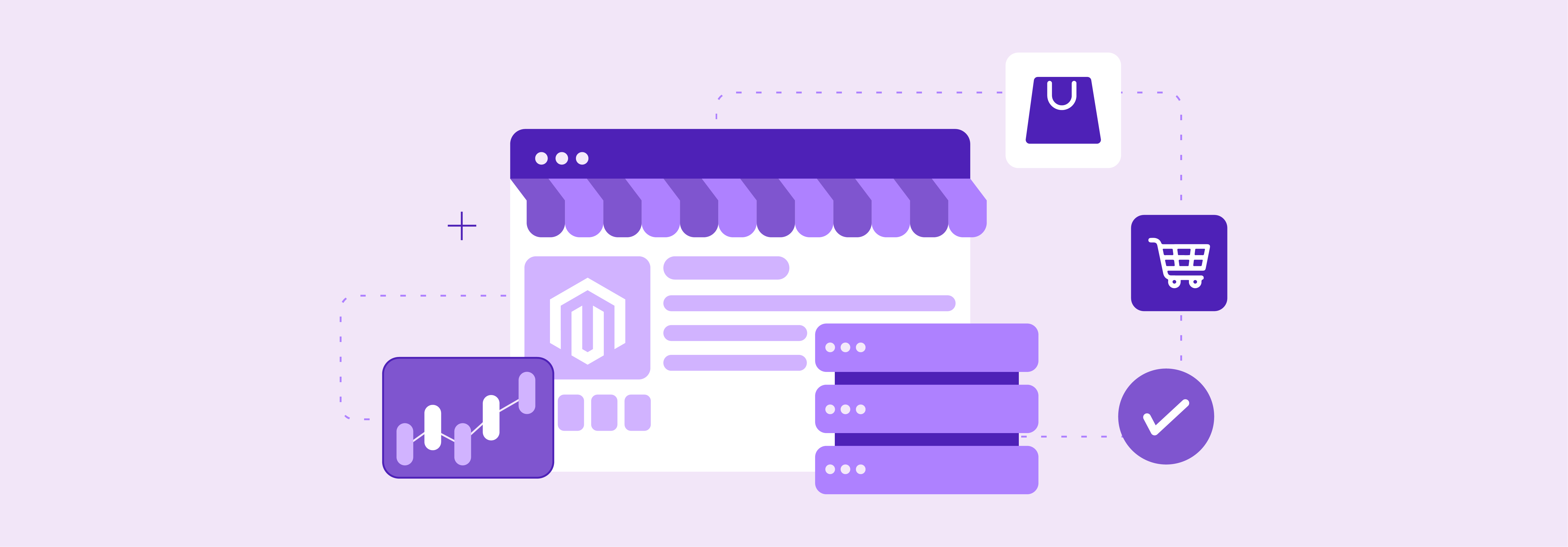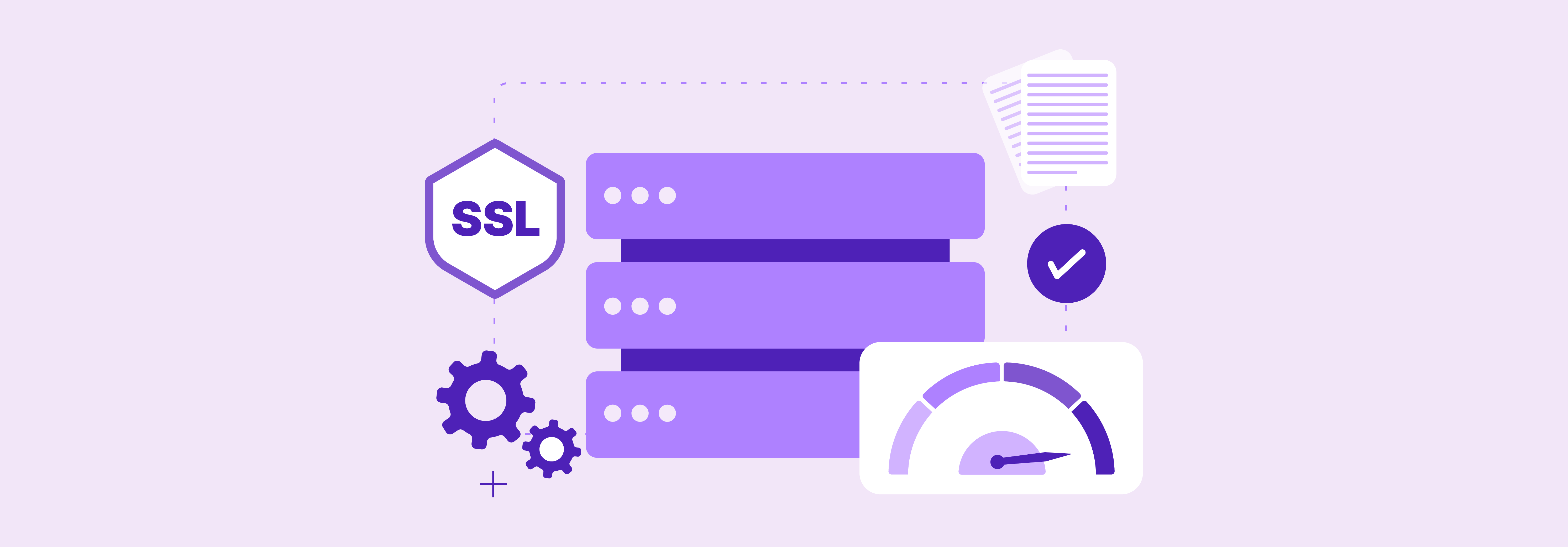
Hosting Magento Webshop: Complete Guide to E-commerce Excellence
With a hosting Magento webshop, you can successfully create an e-commerce store with an optimized online presence, lead generation, and sales. It offers features like personalization, customization, and full control over the design and functionality of your store. This guide will discuss everything you need to host a Magento webshop for e-commerce excellence.
Key Takeaways
-
Learn how to host a Magento webshop for e-commerce excellence.
-
Discover the power of Magento for online retail success.
-
Understand the crucial role of hosting in maximizing your Magento webshop's performance.
-
Explore different hosting environments and their suitability for your Magento store.
-
Get valuable tips on technical specifications, developer tools, and Magento-specific support.
-
Learn about compliance, SSL certificates, backup strategies, and seamless upgrades.
Power of Magento for Online Retail
Magento, as a robust e-commerce platform, brings a comprehensive set of features that cater to the diverse needs of online retail. Below are some of the key strengths Magento offers for businesses aiming to excel in the digital marketplace:
-
Scalability: Magento webshop handles everything from a small boutique to a vast, international online store. Plus, it doesn't compromise performance.
-
Customization: With its flexible modular architecture, Magento allows extensive customization. This helps meet the specific requirements of your business and enables a unique brand experience.
-
Extensive Community and Support: Being open-source, Magento has a vast community of developers. Users continually contribute to its improvement, ensuring a wealth of support and resources.
-
Integrated Checkout, Payment, and Shipping: Magento streamlines essential e-commerce processes. It offers customers a smooth and secure transaction experience.
-
Mobile Responsiveness: Magento recognizes the importance of mobile commerce. They offer mobile-friendly configurations to ensure your store is accessible on any device.
-
SEO Efficiency: It comes built-in with strong SEO features. These enhance your store's visibility and help you rank higher in search engine results.
Role of Hosting in Magento Webshop Success

1. Performance Optimization
-
Server Response Time: Magento's dynamic content generation requires hosting that can deliver quick server response times. This is crucial for maintaining a smooth user experience and minimizing bounce rates.
-
Advanced Caching: Implementing caching solutions like Varnish, Redis, or Full Page Cache is essential for speeding up Magento. These technologies reduce the load on the server. They store copies of pages or page fragments. These copies are then served to visitors quickly, saving time compared to generating the page from scratch.
-
Content Delivery Network (CDN): Using a Magento CDN can significantly improve the loading times of your Magento webshop for users around the globe. A CDN reduces latency and enhances site speed by caching static content (like images, JavaScript, and CSS) on servers closer to the user's location.
2. Security Measures
-
Dedicated Resources: Shared hosting environments can expose your Magento webshop to vulnerabilities from other sites on the same server. Opting for VPS, dedicated, or cloud hosting provides isolated resources, minimizing the risk of cross-site contamination.
-
Regular Updates and Patches: A hosting provider skilled in Magento will ensure that the server's software stack (PHP, MySQL, etc.) is always up-to-date, protecting against vulnerabilities. Additionally, they can manage or assist with applying Magento security patches.
-
SSL Certificates and Secure Data Handling: Secure Socket Layer (SSL) certificates are mandatory for encrypting data between the user's browser and the Magento server, protecting sensitive customer information. A competent Magento host will offer easy installation and management of SSL certificates.
3. Scalability
-
Elastic Resources: The ability to scale server resources up or down based on traffic and sales events is crucial for Magento webshops. Cloud hosting excels in offering flexibility. It ensures your site stays responsive during peak periods. This prevents unnecessary costs during quieter times.
-
Load Balancing: For high-traffic Magento sites, load balancing distributes traffic across multiple servers, preventing any single server from becoming a bottleneck. This ensures consistent performance, even under heavy loads.
4. Expert Support
-
Magento-Specific Support: Hosting providers with Magento expertise can offer invaluable technical support, troubleshooting, and advice. This includes optimization tips, security best practices, and assistance with upgrades or patches.
-
24/7 Monitoring and Support: Continuous monitoring can detect and mitigate issues before they impact your website's performance or security. Round-the-clock support ensures that help is available whenever needed, minimizing downtime.
5. Compatibility and Compliance
-
Server Configuration: Magento has specific requirements for PHP, MySQL/MariaDB, Elasticsearch, and other components. A hosting solution tailored for Magento ensures optimal configuration out of the box.
-
PCI Compliance: PCI DSS compliance is necessary for websites handling credit card information. The right hosting provider will have measures to help you meet these requirements, safeguarding customer data and your reputation.
Decoding Magento Hosting

1. The Anatomy of Magento-Friendly Hosting
-
Server Configuration: Optimized server settings for PHP, MySQL/MariaDB, and web servers like Apache or Nginx to handle Magento's resource-intensive operations.
-
Caching Mechanisms: Using caching tools such as Varnish, Redis, and Memcached to speed up response times and reduce load times for your Magento store.
-
PHP Accelerators: Implementing PHP accelerators like OPcache to improve PHP performance is crucial for Magento's dynamic content generation.
-
Firewalls and Web Application Firewalls (WAF): Magento WAF ensures protection against common web threats and vulnerabilities specific to Magento.
-
SSL Certificates: Ensuring secure data transmission between the server and end-users with SSL/TLS encryption.
-
Regular Backups: Automated backup solutions to restore your Magento store in case of data loss or cyber-attacks.
-
Resource Scalability: Ability to easily scale hosting resources (CPU, RAM, Disk space) to accommodate traffic spikes and growth.
-
Uptime Guarantees: High uptime rates (preferably 99.9% or above) to ensure your webshop is always accessible to customers.
2. Magento Hosting Requirements for a Webshop
Technical Specifications
-
PHP Version: Support for the latest PHP versions that Magento requires, with the ability to update as new releases become available.
-
Database Support: MySQL or MariaDB with the configurations for optimal Magento performance.
-
Elasticsearch: For Magento 2.4 and above, Elasticsearch is required for advanced search capabilities.
Developer Tools and Access
-
SSH Access: Secure Shell access for safe and efficient file transfers, script execution, and site management.
-
Git Integration: Developers can easily manage and collaborate on code changes for version control.
-
Staging Environments: Availability of staging sites to test changes before going live, minimizing disruptions to the live site.
Magento-Specific Support
-
Expertise: Hosting providers with Magento-certified professionals who understand the platform inside and out can offer invaluable support and insights.
-
24/7 Support: Round-the-clock assistance for issues, ensuring minimal downtime and quick resolutions.
Compliance and Security Measures
-
PCI DSS Compliance: Adherence to Payment Card Industry Data Security Standards is necessary for stores accepting credit card payments.
-
Regular Security Scans: Proactive scanning for malware and vulnerabilities to keep the site and customer data safe.
Exploring Magento Hosting Environments

1. Shared vs. Dedicated: Battle of the Hosts
Shared Hosting
-
Definition: Multiple websites hosted on a single server, sharing resources such as CPU, RAM, and disk space.
-
Cost-Effectiveness: The most affordable hosting option, ideal for small businesses and startups with limited budgets.
-
Performance Limitations: Due to shared resources, high traffic on one website can impact the performance of others, potentially affecting your Magento store's speed and user experience.
-
Security Concerns: Increased vulnerability as a compromise to one site on the server can pose risks to all sites hosted on the same server.
Dedicated Hosting
-
Definition: A hosting environment where a single server is dedicated to hosting only your website, providing exclusive access to all its resources.
-
Optimal Performance: With all server resources dedicated to your Magento store, you can expect higher performance levels. This is essential for high-volume traffic and complex eCommerce operations.
-
Enhanced Security: Minimizes security risks since you're not sharing space with potentially vulnerable sites. Offers greater control over security configurations.
-
Cost Consideration: Significantly more expensive than shared hosting, making it suitable for large businesses with substantial budgets.
2. The Rise of Cloud Solutions in Magento Hosting
-
Scalability: Cloud hosting allows for easy scaling of resources to manage traffic spikes without needing to upgrade hardware physically.
-
Cost Efficiency: Typically operates on a pay-as-you-go model. You only pay for the resources you use. This can be more cost-effective than dedicated hosting for fluctuating traffic patterns.
-
Reliability: Enhanced uptime due to the distributed nature of cloud services; if one server goes down, another can take its place, ensuring your Magento store remains online.
-
Performance: Many cloud hosting providers offer advanced caching, content delivery networks (CDN), and other optimizations to improve loading times globally.
3. VPS Hosting: The Middle Ground for Growing Webshops
-
Definition: Virtual Private Server (VPS) hosting divides a physical server into multiple virtual servers, each isolated from the others. This provides a balance between shared and dedicated hosting.
-
Customizability: Offers root access to the server, allowing for extensive customization of the server environment to meet your Magento store’s specific needs.
-
Scalability: Easier to scale compared to shared hosting, as resources can be adjusted based on your store's requirements.
-
Cost and Performance Balance: More affordable than dedicated hosting while providing better performance and security than shared hosting, making it ideal for medium-sized businesses.
4. Managed Magento: Hassle-Free Hosting Solutions
-
Magento-Specific Hosting: Managed Magento hosting is tailored to the unique needs of Magento stores, offering optimized performance, security, and technical configurations.
-
Expert Support: Providers offer Magento experts who handle technical issues, server management, and application-specific concerns, significantly reducing the need for in-house technical expertise.
-
Security and Performance: Includes proactive security measures, performance optimizations, and regular maintenance tasks to ensure your Magento store operates smoothly and securely.
-
Cost vs. Convenience: While more expensive than unmanaged options, the cost is offset by the value of having a team of experts managing your hosting environment and technical infrastructure. This allows you to focus on growing your business.
Architecting Your Magento Hosting Plan

1. Performance Engineering for Magento Hosting
-
Optimized Stack Configuration: Tailor your server stack to meet Magento's specific requirements. This includes using the right PHP, and MySQL/MariaDB versions. It also comprises web servers like Apache or Nginx, configured specifically for Magento to enhance performance.
-
Caching Mechanisms: Implement full-page caching. Utilize Magento-specific caching mechanisms such as Varnish, Redis, or Memcached. This can significantly reduce load and server response times.
-
Content Delivery Network (CDN): Utilize a CDN to distribute static content closer to your users globally, decreasing latency and improving site load times.
-
Database Optimization: Regularly optimize your database to handle queries more efficiently. It is important for Magento's dynamic content generation and search functionality.
2. The Security Blueprint: Fortifying Your Magento Webshop
-
Regular Software Updates: Keep Magento, its extensions, and server software updated with the latest security patches and updates to protect against vulnerabilities.
-
Firewall and WAF: Implement a web application firewall (WAF) and network firewalls to block malicious traffic and protect against common web exploits.
-
SSL Certificates: Use SSL/TLS certificates to encrypt data in transit, ensuring that customer data, such as credit card information and personal details, are secure.
-
Two-factor authentication (2FA) and Strong Password Policies: Enforce Magento 2FA for admin access and maintain strong password policies to safeguard backend access against unauthorized users.
3. Scaling the Summit: Magento Hosting for Growth and Peaks
-
Elastic and Scalable Resources: Choose a hosting solution to scale resources based on demand. This ensures your site stays responsive during traffic surges without paying for unnecessary resources in off-peak times.
-
Load Balancing: Employ load balancing to distribute traffic evenly across multiple servers or instances. It prevents any single server from becoming a bottleneck and ensuring high availability.
-
Performance Monitoring and Optimization: Continuously monitor your webshop’s performance to identify bottlenecks or areas for improvement. Utilize performance data to fine-tune your hosting environment, ensuring it can efficiently handle growth and traffic peaks.
-
Geographical Considerations: For global reach, consider hosting in multiple regions or leveraging cloud hosting solutions. It offers global data centers to minimize latency for international customers.
4. Magento Support Systems: Ensuring Seamless Operations
-
Expert Magento Support: Ensure your hosting provider offers Magento-specific support. They should have experienced technicians who understand the platform's intricacies. This enables them to provide quick resolutions to issues.
-
Automated Backups and Disaster Recovery: Implement regular automated backups. Have a clear disaster recovery plan in place. This helps minimize data loss and downtime in case of a system failure or cyberattack.
-
Performance and Security Monitoring: Utilize continuous monitoring tools for performance and security, enabling you to proactively detect and respond to issues before they affect your users.
-
DevOps Tools and Access: Access to developer-friendly tools and environments is crucial. This includes Git repositories, staging areas, and SSH access. These facilitate continuous integration and deployment (CI/CD) practices, enhancing site management and deployment processes.
The Magento Hosting Toolkit

1. Speed Optimization Secrets for Magento
-
Full Page Caching: Utilize built-in Magento caching or third-party solutions like Varnish to store full page caches, significantly reducing server response times.
-
Content Delivery Network (CDN): Implement a CDN to serve static content from locations closer to the user, decreasing load times.
-
Database Optimization: Regularly clean and optimize the Magento database to improve query performance and reduce latency.
-
Image Optimization: Compress and optimize images without losing quality to decrease page load times.
-
Minification and Merging: Minify CSS and JS files and merge them where possible to reduce the number of HTTP requests.
2. The Safety Net: Backup and Recovery Strategies
-
Automated Backups: Schedule regular backups of your Magento store, including files and databases, to ensure data integrity and facilitate quick recovery.
-
Off-site Storage: Store backup copies in a secure, off-site location to prevent data loss in case of server or data center failures.
-
Disaster Recovery Plan: Develop and test a disaster recovery plan that includes steps for restoring data from backups with minimal downtime.
-
Version Control: Use version control systems like Git to manage and back up your store's codebase, allowing for easy rollbacks to previous versions if needed.
3. SSL Certificates: The Shield of Trust for Your Magento Webshop
-
End-to-End Encryption: Implement SSL certificates to encrypt data transmitted between the user’s browser and your Magento store, safeguarding sensitive information.
-
Trust Indicators: Use SSL to activate HTTPS and the padlock icon in browsers, signaling customers that your site is secure and trustworthy.
-
Search Engine Ranking: SSL certificates contribute to higher rankings, as Google considers HTTPS a ranking factor.
-
Compliance: Ensure compliance with payment industry standards (PCI DSS) using SSL certificates to secure credit card transactions.
4.Seamless Upgrades: Keeping Your Magento Store at Its Peak
-
Staging Environment: Use a staging environment to test new Magento versions, extensions, or custom code before applying them to your live store.
-
Compatibility Checks: Before upgrading, ensure compatibility with existing themes, extensions, and customizations to prevent conflicts.
-
Performance Testing: Conduct performance testing in the staging environment to identify and fix issues affecting site speed or user experience.
-
Regular Updates: Stay on top of Magento, PHP, and other software updates to ensure your store benefits from the latest features, performance improvements, and security patches.
Selecting Your Magento Hosting Partner

1. The Checklist: Evaluating Magento Hosting Providers
| Criteria | Description |
|---|---|
| Performance & Speed | SSD storage for faster data retrieval, Content Delivery Network (CDN) availability, Page load times under 3 seconds |
| Security Features | SSL certificate inclusion, Web Application Firewall (WAF), Regular malware scans and removal |
| Scalability | Easy resource scaling options, Auto-scaling capabilities for traffic spikes |
| Support for Magento | 24/7 technical support knowledgeable in Magento, Magento-optimized server configurations |
| Backup and Recovery | Daily backups, Easy one-click restore options, Off-site storage for backups |
| Uptime Guarantees | 99.9% uptime guarantee, Compensation for downtime beyond the guaranteed level |
| Pricing and Flexibility | Transparent pricing without hidden fees, Flexible plans that grow with your business |
| Magento-specific Features | Pre-installed Magento or one-click Magento installation, Specific optimizations for Magento |
| Developer Tools | Git repositories and SSH access, Staging environments for testing |
| Customer Reviews | Positive feedback on uptime, support, and Magento-specific hosting performance |
2. Beyond the Price Tag: Value Cerations in Magento Hosting
When evaluating Magento hosting options, it's important to look beyond the initial cost and consider the overall value provided. Factors to weigh include:
-
Performance Optimization: Hosting optimized for Magento can significantly improve your store's loading times, affecting user experience and SEO rankings.
-
Security Measures: Advanced security features, regular updates, and proactive threat monitoring can protect your business from data breaches and cyber threats.
-
Technical Support: Access to Magento-knowledgeable support can reduce downtime and ensure issues are quickly resolved, directly impacting your store's reliability.
-
Scalability: Seamlessly scaling resources ensures your hosting environment can grow with your business, supporting traffic spikes without performance hitches.
-
Magento-Specific Tools: Features like one-click Magento installations, pre-configured environments, and Magento-optimized caching can save time and resources.
FAQs
1. What are the best hosting services for Magento webshops?
The best hosting services for Magento webshops are:
- MGT-Commerce
- Hostinger
- FastComet
- Nexcess
- Cloudways
- InMotion
- HostGator
- A2 Hosting
- SiteGround
- GoDaddy, etc
2. How can store owners integrate a shopping cart for their products with Magento?
The integration of a shopping cart is typically straightforward with Magento's platform. Store owners can use Magento's built-in solutions or add functionality through various plugins, ensuring seamless checkout experiences for customers.
3. What gateway options are available for Magento webshops?
Magento supports a variety of payment gateways, enabling merchants to offer multiple payment options. Key gateways include PayPal, Stripe, and Authorize.Net, each providing secure transaction processing.
4. Are there any Magento-specific plugins for inventory management?
Magento offers several plugins for inventory management. Retailers can track stock levels, manage supplier relationships, and automate reordering processes effectively using the Magento dashboard.
5. How do marketing analytics tools integrate with Magento?
Marketing analytics tools can be easily integrated with Magento through third-party extensions or built-in features. These tools help store owners to track customer behavior, measure campaign performance, and optimize marketing strategies.
6. Can store owners migrate their Magento store to a different hosting plan if needed?
Yes, Magento stores can be migrated to different hosting plans. Many hosting companies provide migration services, and Magento's flexibility allows for manual transfer with the support of a control panel like cPanel.
7. What Magento hosting plans generally offer ample bandwidth and memory?
Web hosting companies provide different hosting plans for Magento, each with varying levels of bandwidth and memory. Store owners should choose a service that scales with their traffic and inventory size. They should consider dedicated or cloud hosting for higher requirements.
Summary
Hosting a Magento webshop requires careful consideration of bandwidth, memory, and scalability to ensure smooth operations. A managed Magento hosting plan tailored to the Magento store framework will offer the best performance and flexibility as the store grows.



